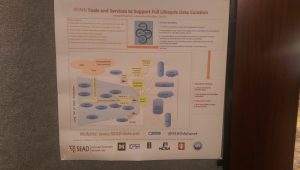Making Research Data Services Work for Everyone
Day two of the 2015 Research Data Access and Preservation (RDAP) Summit focused on methods for assessing research data services. As with any research, validation is key in establishing credibility of data research services in accurately and objectively representing research efforts. The first panel shared methods developed for more effectively assessing the quality of research data services.
The Role of Assessment in Research Data Services
Using Assessment of NSF Data Management Plans to Enable Evidence-Based Evolution of Research Data Services
Amanda Whitmire, Jake Carlson, Patricia Hswe, Susan Wells Parham, Lizzy Rolando and Brian Westra
The Data management plans As a Research Tool (DART) Project was an Institute of Museum and Library Sciences (IMLS) funded project conducted at multiple universities. The end goal was to create a rubric to support standardized assessment of content and quality of data management plans (DMPs) while simultaneously familiarizing librarians with research data needs of their communities. Ultimately, findings could be used to evolve, extend, and expand research data services with targeted services relevant to researchers.
Evaluating Research Needs by Methodology: Assessment at the University of Kansas
Travis Weller, Amalia Monroe-Gulick
Another project evaluated research needs by discipline to better support researchers regardless of research methods used. Surveys were distributed campus-wide at a single university followed by targeted focus groups to identify how people used data and what data services would be most useful. The first significant finding was that the majority of respondents weren’t even aware of the research data services offered on campus. Secondly, respondents conducting research used multiple methodologies requiring that any data solution be flexible, therefore requiring a greater variety of data tools. With a list of research methods used on campus, they’ll be better able to select and evaluate useful tools.
Where’s the Data? Assessing Researcher Compliance with Publisher Requirements for Data Sharing
Kathleen Fear
The third project reviewed the data sharing policies of over 1,000 scholarly journals. The result? Only 39% had a data sharing policy of some kind. Of this 39%, the variability of these policies ran the gamut from clear to vague. However, despite a good number of journals providing data sharing policies, not all researchers actually followed the policies. Some of the outreach ideas for encouraging and facilitating more and better data sharing included regularly linking data and papers, monitoring for papers without shared data, offering assistance in publishing data, targeted presentations and discussion on journals offering data sharing, and supporting researchers new to publishing and publishing data.
Current Issues and Approaches to Curating Student Research Data
The next round of panelists shared lessons learned in attempting to provide more effective research data services to students:
Aaron Collie, Digital Curation Librarian, Michigan State University
- It’s difficult to gain traction for digital preservation unless a mandate is embedded in the mission and strategic objectives of an institution.
- Everything cannot be digitally preserved, so you must strategically select what will be preserved
- Planning and budgeting needs to project at least five years into the future.
- Track researcher use of data services to bolster planning and budgeting objectives.
Sarah Shreeves, Associate Dean for Digital Strategies, University of Miami
- Ownership of researchers’ data and documents must be articulated in policies.
- Researchers need guidelines and training on appropriate documentation for their research.
Dianne Dietrich, Physics and Astronomy Librarian, and Wendy Kozlowski, Scientific
- Outreach is most effective when it strategically targets researchers and occurs at opportune times.
- Campus-wide research processes must be integrated with campus research data services.
Steve Van Tuyl, Data and Digital Repository Librarian, Oregon State University
- Items designated for digital preservation must be scrutinized manually to ensure that documentation is complete and to mitigate potential obsolescence of files.
- Create a baseline for the minimum viable product for digital preservation.
Beyond Metadata: Supporting Non-Standardized Documentation to Facilitate Data Reuse
Adequate metadata description for research data continues to be an ongoing challenge, whether it’s because researchers are not providing the description or digital preservation tools cannot accommodate the necessary description. The speakers on this panel shared methods they’ve used to ease the description process.
Lizzy Rolando, Research Data Librarian, Georgia Institute of Technology
In one case, a README.txt template was used to capture description with moderate success. During a number of subsequent interviews with researchers, it became evident that researchers either only documented description of their data if they were sharing it or didn’t know where to find guidance on how best to document description of their data. In analyzing interview findings, they realized that metadata and documentation needs were incredibly diverse. One size did not fit all disciplines, so README.txt templates were developed specifically for each research discipline.
Sara Mannheimer, Data Management Librarian, Montana State University
Another case dealt with the fact that metadata description is so structured when data is usually messy. They interviewed researchers about how they did their documentation and what kinds of attitudes they had about the process. They too found that documentation was discipline-specific. They determined that the best way librarians could facilitate researchers completing metadata description was to interview them on a regular basis and use feedback to improve services, focus outreach on disciplines requiring extensive or complex metadata description, and to develop services which were discipline-focused.
Kristin Briney, Data Services Librarian, University of Wisconsin-Milwaukee
Another panelist experienced low turnout for data management courses she offered, but discovered that strategic marketing could significantly increase attendance. She’s also more subtle in conveying best practices, choosing to articulate them in language familiar to her audiences rather than relying on jargon or overly complex explanations. Using the data management course content, she has also produced a series of five-minute videos which are watched frequently by those too busy to attend her webinars or in-person courses. This panelist made a point of saying that any step towards better documentation is a step in the right direction and she is there to help them take each step. In the end, training is incredibly useful, but it must speak to the unique requirements of each discipline.
Sarah Pickle, CLIR/DLF Social Science Data Curation Fellow, Penn State University Libraries
The last panelist emphasized that the loss of data context can lead to misuse of data. In order to avoid this loss, it’s important to involve everyone impacting the data sharing process, such as IT, policy makers, and program officers, especially when it data sharing dictates privacy requirements. Secure technology must be implemented for transport, storage, access, and use of data. Additionally, data use agreements are necessary to clarify disclosure of risks, provide informed consent language, and numerate IT specifications, just to name a few.
RDAP wrapped up with a poster session and here is a sampling of a few (click on images for larger view):
Lost in the Data Jungle: A Case Study for Organizing, Publishing, and Preserving Research Data
Qianjin Zhang, Sara Scheib, University of Iowa
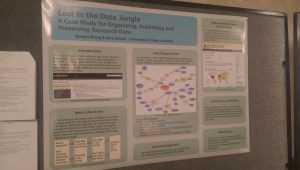
Navigating the rocky road to research data acceptance
Laura Palumbo, Aletia Morgan, Rutgers University
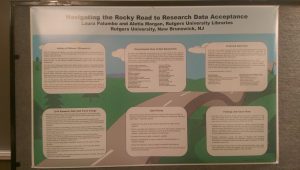
Planning to Learn, Learning to Plan!
Reid Otsuji, Dominique Turnbow, Amanda Heath, Mary Linn Bergstrom, UC San Diego
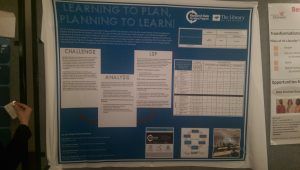
The two-for-one workshop: mapping data management services to the research lifecycle
Amanda Rinehart, Ohio State University
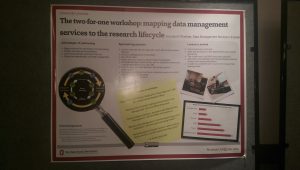
Using a Case Study to Teach Data Management to Librarians
Sherry Lake, Andrea Denton, University of Virginia
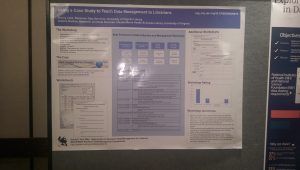
SEAD: Tools and Services to Support Full-Lifecycle Data Curation
Margaret Hedstrom, University of Michigan
